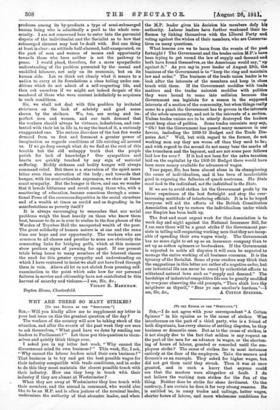WHY ARE THERE SO MANY STRIKES ?
[To TEE EDITOR OP THE " SPECTATOR."]
SIR,—Will you kindly allow me to supplement my letter in your last issue on this the greatest question of the day P The workers of the country will now be taking stock of the situation, and after the events of the past week they are sure to ask themselves, " What good have we done by sending our leaders to Parliament P" Let them put this question to them- selves and quietly think things over.
I asked you in my letter last week, " Why cannot the Government mind its own business ? " This week, Sir, I ask, " Why cannot the labour leaders mind their own business business?" That business is to try and get the best possible wages for their industry compatible with trade conditions, and in order to do this they must maintain the closest possible touch with their industry. How can they keep in touch with their industry if they are absent at Westminster ?
When they are away at Westminster they lose touch with their members, and the second in command, who would also like to be an M.P. and is often jealous of the nominal leader, undermines the authority of that absentee leader, and when
the M.P. leader gives his decision his members defy big authority. Labour leaders have further weakened their in• finence by linking themselves with the Liberal Party and voting against the wishes of their members, who are Conserve,. tives on many questions.
What lessons are we to learn from the events of the past fortnight P The Government and the trades union M.P.'s have been trying to get round the law of supply and demand and both have found themselves, as the Americans would say," up against it." As you say in your leader of August 19th, the business of the Government is to "keep the ring and maintain law and order." The business of the trade union leader is to look after the interests of the members and keep in close touch with them. If the Government meddles with trade matters and the trades unionist meddles with politics they were bound to come into collision because the Government can legislate for a season in the supposed interests of a section of the community, but when things really come to a pinch the Government has to govern in the interests of the whole community, and not in the interests of a section. Unless trades unions are to be utterly destroyed the leaders must keep clear of politics. Some trades unionists may say, " Oh ! but the Government has passed many measures in our favour, including the 1909-10 Budget and the Trade Dis- putes Act." Well, but with regard to the former, do not working men say they are worse off than they used to be; and with regard to the second do not many bear the marks of the truncheon and the bayonet, and are not some poor fellows laid low for ever P If it had not been for the extra taxation laid on the capitalist by the 1909-10 Budget there would have been more money available for advances of wages.
Your paper, Sir, has been almost alone in its championing the cause of individualism, and it has been of incalculable good in exposing the fallacies of quack nostrums. The State must look to the individual, not the individual to the State.
If we are to avoid strikes let the Government profit by its bitter experience of the last fortnight and stop the ever- increasing multitude of interfering officials. It is to be hoped everyone will aid the efforts of the British Constitution Association and try to restore the individualism under which our Empire has been built up.
The first and most urgent work for that Association is to work day and night against the National Insurance Bill, for I am sure there will be a great strike if the Government per- sists in telling self-respecting working men that they are incap- able of spending their own wages wisely. The Government has no more right to set up as an insurance company than to set up as cotton spinners or bootmakers. If the Government is expected to settle all disputes it will soon be expected to manage the entire working of all business concerns. It is the tyranny of the Socialist. Some of your readers may think that the suggestions in this letter are rather of a negative order, but our industrial ills can never be cured by collectivist efforts to withstand natural laws such as " supply and demand." The hardships of industrial competitive life can he greatly modified by everyone observing the old precepts, " Thou shalt love thy neighbour as thyself," "Bear ye one another's burdens."—I


































 Previous page
Previous page